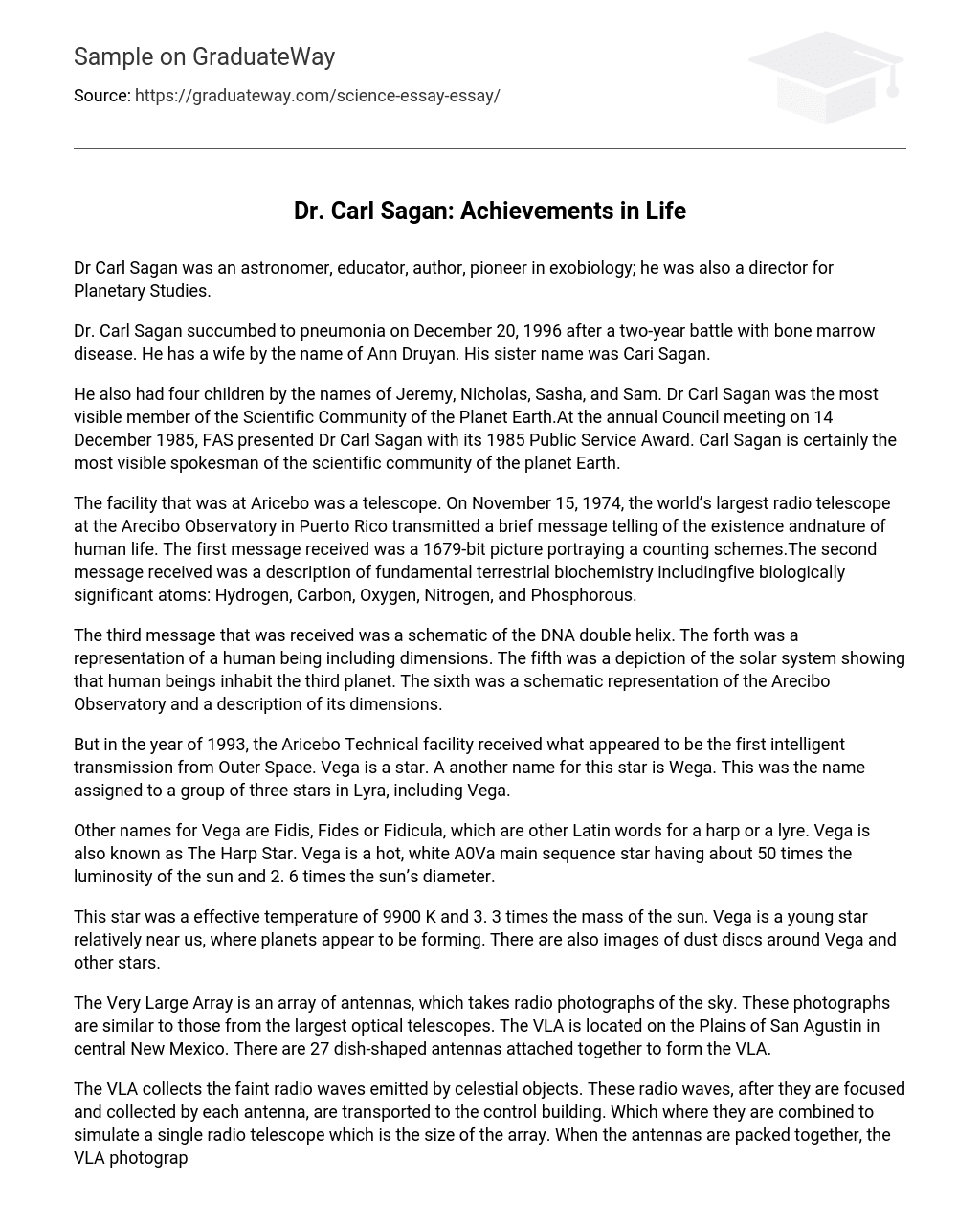Dr Carl Sagan was an astronomer, educator, author, pioneer in exobiology; he was also a director for Planetary Studies.
Dr. Carl Sagan succumbed to pneumonia on December 20, 1996 after a two-year battle with bone marrow disease. He has a wife by the name of Ann Druyan. His sister name was Cari Sagan.
He also had four children by the names of Jeremy, Nicholas, Sasha, and Sam. Dr Carl Sagan was the most visible member of the Scientific Community of the Planet Earth.At the annual Council meeting on 14 December 1985, FAS presented Dr Carl Sagan with its 1985 Public Service Award. Carl Sagan is certainly the most visible spokesman of the scientific community of the planet Earth.
The facility that was at Aricebo was a telescope. On November 15, 1974, the world’s largest radio telescope at the Arecibo Observatory in Puerto Rico transmitted a brief message telling of the existence andnature of human life. The first message received was a 1679-bit picture portraying a counting schemes.The second message received was a description of fundamental terrestrial biochemistry includingfive biologically significant atoms: Hydrogen, Carbon, Oxygen, Nitrogen, and Phosphorous.
The third message that was received was a schematic of the DNA double helix. The forth was a representation of a human being including dimensions. The fifth was a depiction of the solar system showing that human beings inhabit the third planet. The sixth was a schematic representation of the Arecibo Observatory and a description of its dimensions.
But in the year of 1993, the Aricebo Technical facility received what appeared to be the first intelligent transmission from Outer Space. Vega is a star. A another name for this star is Wega. This was the name assigned to a group of three stars in Lyra, including Vega.
Other names for Vega are Fidis, Fides or Fidicula, which are other Latin words for a harp or a lyre. Vega is also known as The Harp Star. Vega is a hot, white A0Va main sequence star having about 50 times the luminosity of the sun and 2. 6 times the sun’s diameter.
This star was a effective temperature of 9900 K and 3. 3 times the mass of the sun. Vega is a young star relatively near us, where planets appear to be forming. There are also images of dust discs around Vega and other stars.
The Very Large Array is an array of antennas, which takes radio photographs of the sky. These photographs are similar to those from the largest optical telescopes. The VLA is located on the Plains of San Agustin in central New Mexico. There are 27 dish-shaped antennas attached together to form the VLA.
The VLA collects the faint radio waves emitted by celestial objects. These radio waves, after they are focused and collected by each antenna, are transported to the control building. Which where they are combined to simulate a single radio telescope which is the size of the array. When the antennas are packed together, the VLA photographs are like that from a wide-angle lens on a camera.
When the antennas are as far apart as 20 miles, zoom-lens photographs are obtained. SETI stands for Search for Extraterrestrial Intelligence.SETI is a scientific group who looks out into space to find out if there is life out there. These scientist spend their life trying to find out if there are any other life besides us on the planet earth.
The types of signals that the astronomers were looking for in the movie were the signals that Aricebo was receiving. The astronomers were noticing the mathematical pattern signals that they were receiving. They noticed that their signals were in patterns of odd numbered of beats. They also noticed that they received one of the first satellite programs that were sent out into space.
After over the many years someone from outer space returned their satellite signal back to them. The Hubble Space Telescope was designed to be a different type of mission for NASA — a long-term space- based observatory. Hubble has special grapple fixtures, 76 handholds, and stabilized in all three axes. HST is a 2.
4-meter reflecting telescope, which was deployed, in low-Earth orbit (600 kilometers) by the crew of the space shuttle Discovery on 25 April 1990. HST’’s current complement of science instruments include three cameras, two spectrographs, and fine guidance sensors.Because of HST’s location above the Earth’s atmosphere, these science instruments can produce high-resolution images of astronomical objects. Ground-based telescopes can seldom provide resolution.
These studies are both very important to astronomy because both of these things intercept signals from outer space. These telescopes are very helpful to mankind because with out these telescopes you wouldn’t know if comets or other types of materials were going to hit earth. These telescopes are very helpful also because without these telescopes you wouldn’t be able to see far into outer space and see the planets.





